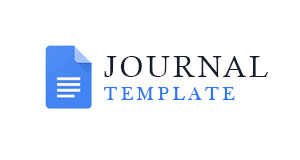Does Financial Performance Determine A Going Concern Audit Opinion? An Empirical Study In Agriculture Industry
Abstract
Global economic uncertainty due to the US-China Trade War and the emergence of the COVID-19 pandemic has made many companies unable to maintain their business continuity. It raises concerns from investors, who believe the target company cannot provide optimal returns on their invested funds. As a result, investors tend to withdraw the funds that have been invested so that they do not experience unexpected losses. Therefore, researchers are interested in analyzing how much financial performance can influence the auditor in giving a going concern audit opinion. This study uses a quantitative approach, and the data is from the agriculture sub-sector companies listed on the Indonesia Sharia Stock Index. The sampling technique in this study used purposive sampling, resulting in 30 samples being analyzed using logistic regression. The study results prove that the solvency and profitability ratios influence the auditor in giving a Going concern audit opinion. Activity ratio does not influence the auditor in giving a Going concern audit opinion.
Keywords
Full Text:
PDFReferences
Aboud, A., & Robinson, B. (2022). Fraudulent financial reporting and data analytics: an explanatory study from Ireland. Accounting Research Journal, 35(1), 21–36.
Al Shbail, M. O., Alshurafat, H., Ananzeh, H., Mansour, E., & Hamdan, A. (2022). Factors affecting the adoption of remote auditing during the times of COVID-19: An integrated perspective of diffusion of innovations model and the technology acceptance model. International Conference on Business and Technology, 38–53.
Alfadel, M., Costa, D. E., Shihab, E., & Adams, B. (2023). On the discoverability of npm vulnerabilities in node. js projects. ACM Transactions on Software Engineering and Methodology, 32(4), 1–27.
Avramov, D., Cheng, S., Lioui, A., & Tarelli, A. (2022). Sustainable investing with ESG rating uncertainty. Journal of Financial Economics, 145(2), 642–664.
Ayogu, M. (2023). Fostering Transparency and Accountability Enhancing Statutory Audits in Nigeria. Journal of Business and Economic Options, 6(1), 37–44.
Bauer, D., Lörwald, A. C., Wüst, S., Beltraminelli, H., Germano, M., Michel, A., & Schnabel, K. P. (2021). Development, production and evaluation of 2-dimensional transfer tattoos to simulate skin conditions in health professions education. BMC Medical Education, 21(1), 350.
Cahyani, U. E., Siregar, R. M. A., & Napitupulu, R. M. (2021). Islamic Wealth Management During the Covid-19 Pandemic. At-Tijaroh: Jurnal Ilmu Manajemen Dan Bisnis Islam.
Cahyani, U. E., Ardiansyah, M., & Sunaryati, S. (2020). Islamic Social Reporting and Financial Distress In List of Sharia Securities. IQTISHADIA, 13(2), 157. https://doi.org/10.21043/iqtishadia.v13i2.7756
Cepni, O., Demirer, R., Pham, L., & Rognone, L. (2023). Climate uncertainty and information transmissions across the conventional and ESG assets. Journal of International Financial Markets, Institutions and Money, 83, 101730.
Chu, L., Fogel-Yaari, H., & Zhang, P. (2024). The estimated propensity to issue going concern audit reports and audit quality. Journal of Accounting, Auditing & Finance, 39(2), 589–613.
Church, B. K., Dai, N. T., Kuang, X., & Liu, X. (2020). The role of auditor narcissism in auditor‐client negotiations: Evidence from China. Contemporary Accounting Research, 37(3), 1756–1787.
de Ricquebourg, A. D., & Maroun, W. (2023). How do auditor rotations affect key audit matters? Archival evidence from South African audits. The British Accounting Review, 55(2), 101099.
Fan, G., Deng, Z., & Liu, L. C. (2023). Understanding the antecedents of patients’ missed appointments: The perspective of attribution theory. Data Science and Management, 6(4), 247–255.
Friedrich, C., Quick, R., & Schmidt, F. (2024). Auditor‐provided non‐audit services and perceived audit quality: Evidence from the cost of equity and debt capital. International Journal of Auditing, 28(2), 388–407.
Gatti, S., Ivanova, M. N., & Pündrich, G. (2023). Corporate bankruptcy and directors’ reputation: An empirical analysis of the effects on public debt contracts. Journal of Accounting, Auditing & Finance, 38(4), 777–803.
Harahap, D., Afandi, A., Siregar, T. M., Hasibuan, A. N., & Cahyani, U. E. (2024). WILL DIGITAL BANKING TRANSFORMATION AFFECT CONSUMER BEHAVIOR IN THE FINANCIAL SECTOR? Journal of Applied Structural Equation Modeling, 8(1), 1–20. https://doi.org/10.47263/JASEM.8(1)06
Hasanuddin, R., Darman, D., Taufan, M. Y., Salim, A., Muslim, M., & Putra, A. H. P. K. (2021). The effect of firm size, debt, current ratio, and investment opportunity set on earnings quality: an empirical study in Indonesia. The Journal of Asian Finance, Economics and Business, 8(6), 179–188.
Hasibuan, A. N. (2022). The Role of Company Characteristics in the Quality of Financial Reporting in Indonesian. Jurnal Ilmiah Peuradeun, 10(1), 1. https://doi.org/10.26811/peuradeun.v10i1.666
Hendijani Zadeh, M. (2022). Auditee’s payout policies: does audit quality matter? Managerial Auditing Journal, 37(5), 542–564.
Hutauruk, M. R. (2024). The effect of R&D expenditures on firm value with firm size moderation in an Indonesia palm oil company. Cogent Business & Management, 11(1), 2317448.
Lippert, B., Perthes, V., & und Politik-SWP-Deutsches, S. W. (2020). Strategic rivalry between United States and China: Causes, tragectories, and implications for Europe.
Liu, X. (2023). Fear to lose? An analysis of CEO successors’ decision-making regarding R&D intensity based on behavioral agency theory. Asian Business & Management, 22(1), 403–430.
Lubis, R., Khairun Nasirin, W., & Nasution, A. A. (2023). Nexus Between Foreign Direct Investment, Islamic Financial Performance and Economic Growth with Economic Freedom as Moderating Variable. International Journal of Islamic Business and Economics (IJIBEC), 7(1), 49–63. https://doi.org/10.28918/ijibec.v7i1.6920
Meleschenko, S. S., Snetkova, T. A., Lyzhova, A. V, Markaryan, S. E., & Khafizova, L. V. (2020). Aspects of Environmental Issues in the Audit Evidence. Procedia Environmental Science, Engineering and Management, 7(3), 395–407.
Mosimege, S. B., & Masiya, T. (2022). Assessing audit outcomes of pre-determined objectives in a public institution (South Africa). International Journal of Productivity and Performance Management, 71(6), 2296–2315.
Muda, I., & Hasibuan, A. N. (2018). Public Discovery of the Concept of Time Value ofMoney with Economic Value of Time. In Emerald Reach Proceedings Series (Vol. 1, pp. 251–257). Emerald Publishing Limited. https://doi.org/10.1108/978-1-78756-793-1-00050
Oino, I. (2021). Bank solvency: The role of credit and liquidity risks, regulatory capital and economic stability. Banks and Bank Systems, 16(4), 84–100.
Pham, D. H. (2022). Determinants of going-concern audit opinions: evidence from Vietnam stock exchange-listed companies. Cogent Economics & Finance, 10(1), 2145749.
Rashid, C. A. (2023). Social capital accounting and financial performance improvement: the role of financial information reliability as a mediator. Journal of Islamic Accounting and Business Research.
Reimer, A., Doll, J. E., Boring, T. J., & Zimnicki, T. (2023). Scaling up conservation agriculture: An exploration of challenges and opportunities through a stakeholder engagement process. Journal of Environmental Quality, 52(3), 465–475.
Sadalia, I., Irawati, N., Ilham, R. N., Hasibuan, A. N., Sinurat, M., & Saharuddin. (2022). Conjuncture Fluctuation Effect from Commodity Supercycle Pattern: Empirical Case Between Velocity and Risk Factor on Return Cryptocurrency in Indonesia. 3rd International Conference on Business and Management of Technology (ICONBMT 2021), Surabaya, Indonesia. https://doi.org/10.2991/aebmr.k.211226.031
Schuler, B. (2024). Increased Uncertainty in Times of Crises and Implications for Financial Reporting, Focusing on the Going Concern Principle. In Finance in Crises: Financial Management Under Uncertainty (pp. 23–38). Springer.
Sekaran, U., Lai, L., Ussiri, D. A. N., Kumar, S., & Clay, S. (2021). Role of integrated crop-livestock systems in improving agriculture production and addressing food security–A review. Journal of Agriculture and Food Research, 5, 100190.
Squires, B., & Elnahla, N. (2020). The roles played by boards of directors: an integration of the agency and stakeholder theories. Transnational Corporations Review, 12(2), 126–139.
Stringer, L. C., Fraser, E. D. G., Harris, D., Lyon, C., Pereira, L., Ward, C. F. M., & Simelton, E. (2020). Adaptation and development pathways for different types of farmers. Environmental Science & Policy, 104, 174–189. Syarif, A. (2023). Pasar Modal Syariah: Resiliensi Global dan Krisis Pandemi. Bening Media Publishing.
Syarif, A., & Maulana, B. (2022). Pengaruh Kinerja Keuangan dan Kinerja Non-Keuangan Terhadap Return Saham Perusahaan Perkebunan di Indonesia. Journal of Trends Economics and Accounting Research, 3(2), 84–93.
Syarif, A., Maulana, B., Salsabila, Z., & Maulana, A. (2023). Financial Performance Of Sharia Commercial Banks In Indonesia: Does Capital Structure Matter? At-Tijaroh: Jurnal Ilmu Manajemen Dan Bisnis Islam, 9(2), 242–252.
Thilmany, D., Canales, E., Low, S. A., & Boys, K. (2021). Local food supply chain dynamics and resilience during COVID‐19. Applied Economic Perspectives and Policy, 43(1), 86–104.
Weiler, S. M., & Jacobsen, T. (2021). “I’m getting too old for this stuff”: The conceptual structure of tattoo aesthetics. Acta Psychologica, 219, 103390.
DOI: https://doi.org/10.24952/tijaroh.v10i1.11714
Refbacks
- There are currently no refbacks.
Copyright (c) 2024 At-tijaroh: Jurnal Ilmu Manajemen dan Bisnis Islam

This work is licensed under a Creative Commons Attribution-ShareAlike 4.0 International License.








